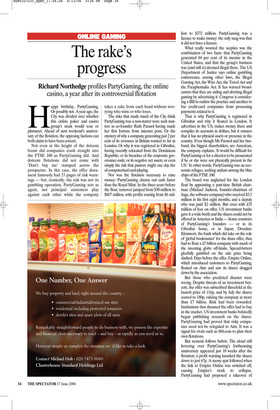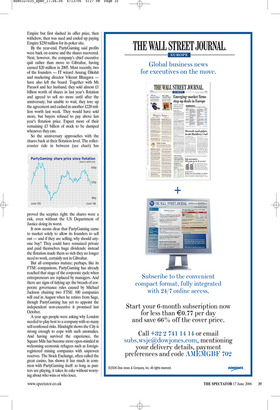The rake’s progress
Richard Northedge profiles PartyGaming, the online casino, a year after its controversial flotation Happy birthday, PartyGaming. Or possibly not. A year ago, the City was divided over whether this online poker and casino group’s stock would soar or plummet. Ahead of next weekend’s anniversary of the flotation, the opposing factions can both claim to have been correct.
Not even at the height of the dotcom boom did companies crash straight into the FTSE 100 as PartyGaming did. And dotcom flotations did not come with ‘Don’t buy me’ stamped across the prospectus. In this case, the offer document famously had 33 pages of risk warnings — but, ironically, the risk was not its gambling operation. PartyGaming acts as agent, not principal: customers play against each other while the company takes a rake from each hand without worrying who wins or who loses.
The risks that made much of the City think PartyGaming was a non-starter were such matters as co-founder Ruth Parasol having made her first fortune from internet porn. Or the mystery of why a company generating just 2 per cent of its revenues in Britain wanted to list in London. Or why it was registered in Gibraltar, having recently relocated from the Dominican Republic; or its breaches of the corporate governance code; or its negative net assets; or even simply the risk that punters might one day tire of computerised card-playing.
Nor was the flotation necessary to raise money: PartyGaming churns out cash faster than the Royal Mint. In the three years before the float, turnover jumped from $30 million to $607 million, with profits soaring from $6 mil lion to $372 million. PartyGaming was a licence to make money: the only snag was that it did not have a licence.
What really worried the sceptics was the combination of two facts: that PartyGaming generated 84 per cent of its income in the United States, and that the group’s business was (and still is) deemed illegal there. The US Department of Justice says online gambling contravenes, among other laws, the Illegal Gaming Act, the Wire Act, the Travel Act and the Paraphernalia Act. It has warned broadcasters that they are aiding and abetting illegal gaming by advertising it. Congress is considering a Bill to outlaw the practice and another to bar credit-card companies from processing payments related to it.
That is why PartyGaming is registered in Gibraltar and why it floated in London. It advertises in the US, makes money there and compiles its accounts in dollars, but it ensures that it has no physical assets or presence in the country. Even though Ms Parasol and her husband, the biggest shareholders, are American, the company explains, ‘It would be difficult for PartyGaming or for a director to be prosecuted if he or she were not physically present in the US.’ In other words, PartyGaming was an economic refugee, seeking asylum among the blue chips of the FTSE 100.
The board was anglicised for the London float by appointing a part-time British chairman (Michael Jackson, founder-chairman of Sage, the software company) who received $3.3 million in his first eight months, and a deputy who was paid $2 million. But even with £35 million of fees on offer, US investment banks gave it a wide berth and the shares could not be offered in America or India — home countries of PartyGaming’s founders — or in its Gibraltar home, or in Japan. Dresdner Kleinwort, the bank which did take on the role of ‘global bookrunner’ for the share offer, thus had to float a £5 billion company with much of the investing globe off-limits. Spread-betters gleefully gambled on the sale price being slashed. Days before the offer, Empire Online, which introduced customers to PartyGaming, floated on Aim and saw its shares dragged down by the association.
But those who predicted disaster were wrong. Despite threats of an investment boycott, the offer was subscribed threefold at the launch price of 116p, and by July the shares soared to 180p, valuing the company at more than £7 billion. Risk had been rewarded. Institutions that shunned the offer had to buy in the market. US investment banks belatedly began publishing research on the shares. PartyGaming had proved that risky companies need not be relegated to Aim. It was a signal for rivals such as 888.com to plan their own flotations.
But nemesis follows hubris. The cloud still hovering over PartyGaming’s forthcoming anniversary appeared just 10 weeks after the flotation: a profit warning knocked the shares down to just 67p. A messy spat followed when the link to Empire Online was switched off, causing Empire’s stock to collapse. PartyGaming had proposed a takeover of Empire but first slashed its offer price, then withdrew, then was sued and ended up paying Empire $250 million for its poker site.
By the year-end, PartyGaming said profits were back on course and the shares recovered. Next, however, the company’s chief executive quit rather than move to Gibraltar, having earned $20 million in 2005. Most recently, two of the founders — IT wizard Anurag Dikshit and marketing director Vikrant Bhargava have also left the board. Together with Ms Parasol and her husband, they sold almost £1 billion worth of shares in last year’s flotation and agreed to sell no more until after the anniversary; but unable to wait, they tore up the agreement and cashed in another £220 million worth last week. They would have sold more, but buyers refused to pay above last year’s flotation price. Expect more of their remaining £3 billion of stock to be dumped whenever they can.
So the anniversary approaches with the shares back at their flotation level. The rollercoaster ride in between (see chart) has proved the sceptics right: the shares were a risk, even without the US Department of Justice doing its worst.
It now seems clear that PartyGaming came to market solely to allow its founders to sell out — and if they are selling, why should anyone buy? They could have remained private and paid themselves huge dividends: instead the flotation made them so rich they no longer need to work, certainly not in Gibraltar.
But all companies mature; perhaps, like its FTSE companions, PartyGaming has already reached that stage of the corporate cycle when entrepreneurs are replaced by managers. And there are signs of tidying up: the breach of corporate governance rules caused by Michael Jackson chairing two FTSE 100 companies will end in August when he retires from Sage, though PartyGaming has yet to appoint the independent non-executive it promised last October.
A year ago people were asking why London needed to play host to a company with so many self-confessed risks. Hindsight shows the City is strong enough to cope with such anomalies. And having survived the experience, the Square Mile has become more open-minded in welcoming economic refugees such as foreignregistered mining companies with unproven reserves. The Stock Exchange, often called the great casino, has shown it has much in common with PartyGaming itself: so long as punters are playing, it takes its rake without worrying about who wins or who loses.



















































































 Previous page
Previous page